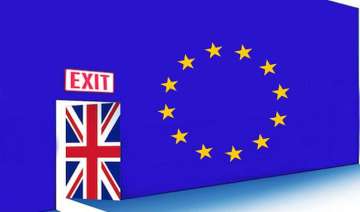Brussels/London: European Union chiefs today told Britain to start negotiations to quit the bloc ‘as soon as possible’, after outgoing Prime Minister David Cameron said he would leave it to his successor to decide when to invoke Article 50, which triggers a departure from the group.
"We now expect the United Kingdom government to give effect to this decision of the British people as soon as possible, however painful that process may be," said a joint statement after Britons voted for a Brexit. "Any delay would unnecessarily prolong uncertainty."
The statement was issued by EU president Donald Tusk, European Commission chief Jean-Claude Juncker, EU Parliament leader Martin Schulz and Dutch premier Mark Rutte, whose country holds the rotating presidency of the bloc, after crisis talks in Brussels.
Tusk told reporters in Brussels, after the results of the referendum on leaving was announced in the UK, that the EU's 27 remaining member nations would remain unified despite Britain's decision.
"We are determined to keep our unity at 27," Tusk said. But he acknowledged that "there's no way of predicting all the political consequences of this event, especially for the U.K."
BREXIT
Tusk said that EU leaders will meet without British Prime Minister David Cameron next week on the sidelines of a summit in Brussels "to start a wider reflection on the future of our Union."
While he admitted that the last year, with its economic crisis, Greek euro woes and refugee emergency, has been one of the toughest in EU history, Tusk said: "What doesn't kill you, makes you stronger."
Top European Union officials were hunkering down in Brussels to try to work out what to do next after the shock decision by British voters to leave.
European Commission President Jean-Claude Juncker is hosting talks with Tusk, European Parliament President Martin Schulz and Dutch Prime Minister Mark Rutte, whose country holds the EU's rotating presidency.
The four will try to agree on a European position on the vote, which could see a member country leave the bloc for the first time ever, ahead of a summit of all 28 EU leaders in Brussels starting on Tuesday. Parliamentary leaders were meeting separately, and European commissioners — the EU's executive body — could also hold separate talks.
EU officials have been aware of the possibility that a British vote to leave might come, but while the mechanism for an exit is enshrined in EU law no one is sure how a departure would play out.
The head of the biggest bloc in the parliament fired an early warning shot at Cameron that Britain should expect no free ride as it negotiates its departure.
"There cannot be any special treatment for the United Kingdom. The British people have expressed their wish to leave the EU. Leave means leave. The times of cherry-picking are over," European Peoples Party leader Manfred Weber said.
He insisted that the exit negotiations "should be concluded within two years."
This insistence on a "hard exit" is aimed at discouraging other countries from wanting to leave the bloc in the belief that they might be able to negotiate a comfortable partnership from the outside.
Many European officials fear the U.K. vote will play into the hands of the far right and left and fuel calls for referendums in other countries.
With AP Inputs
Latest World News
